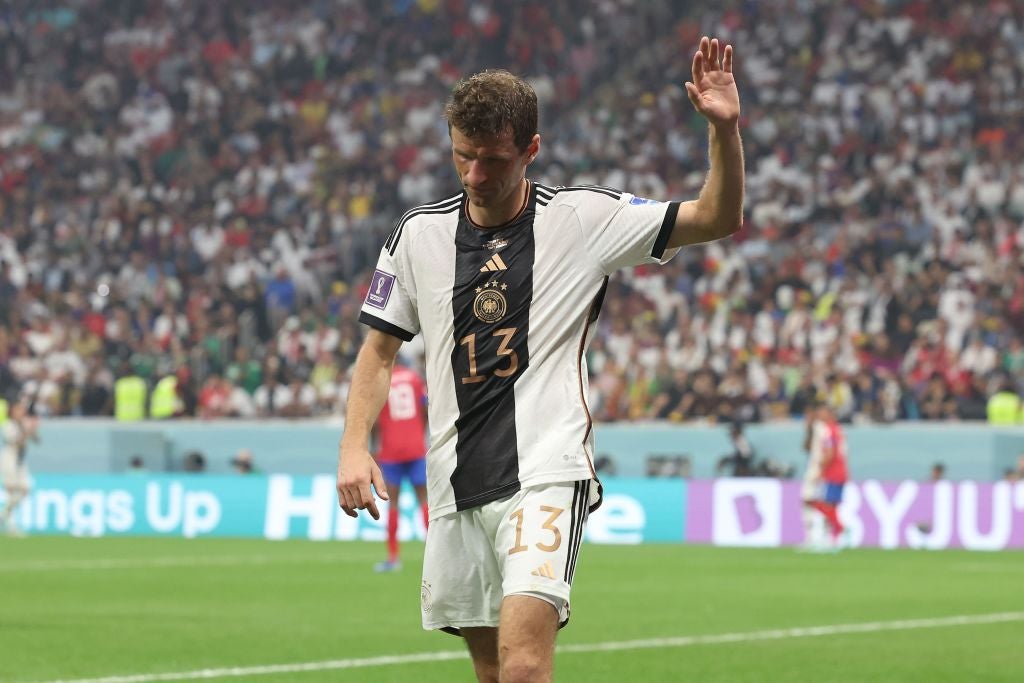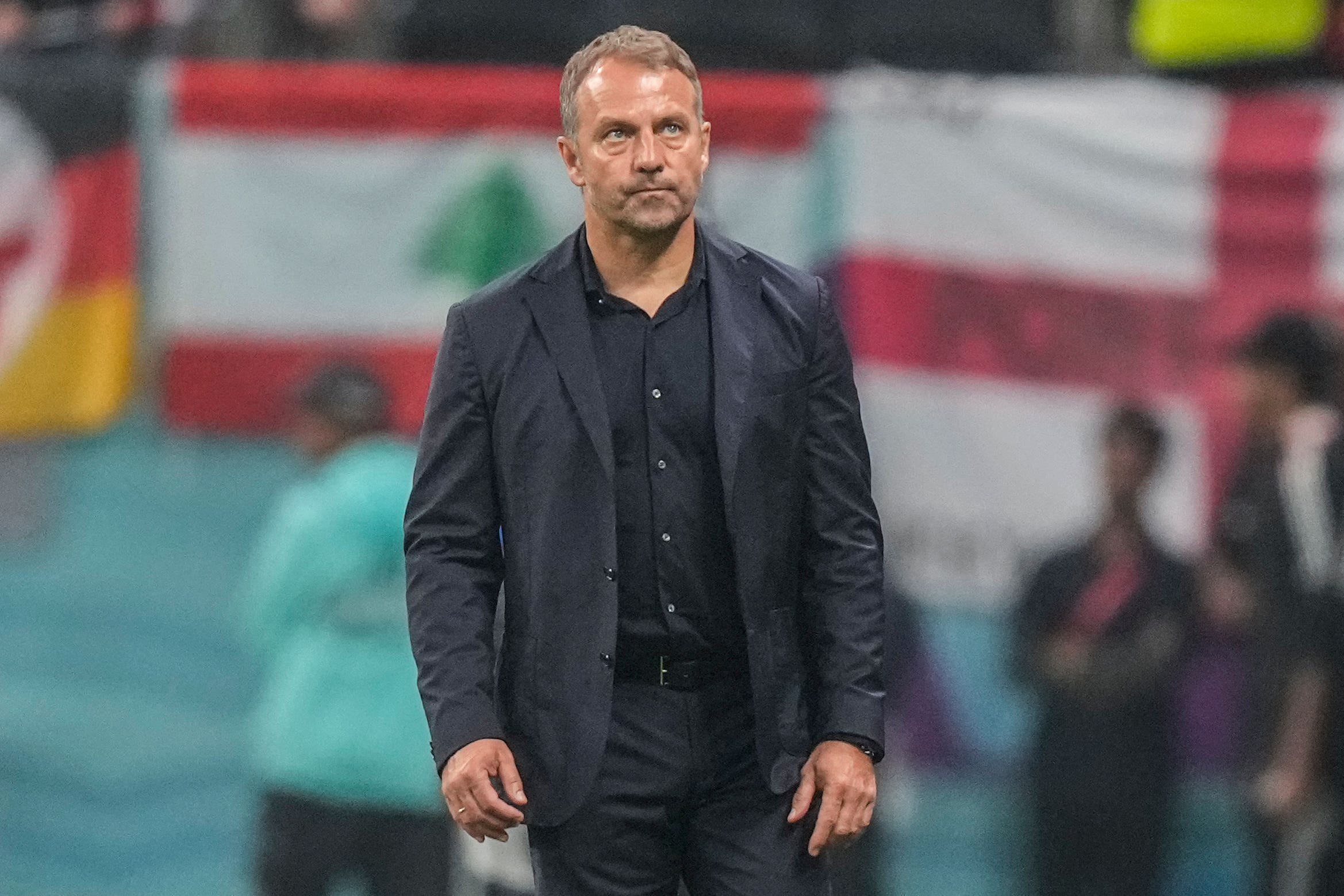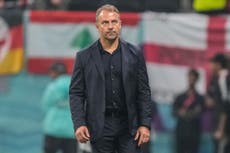‘An absolute catastrophe’: Germany plunged into identity crisis after World Cup exit
Germany have lacked toughness and flawlessness in their last two group stage exits. It is time now not just for another reboot but an overhaul
A few minutes had passed since the kind of scenario that, until a few years ago, no one under the age of 80 had witnessed, and Thomas Muller was waving. Germany had gone out of the World Cup at the first hurdle, just as they did in 2018, and Muller seemed to be waving goodbye to their supporters. It was a chastening end for a genuine Germany great. It will not be remembered as the night he drew level with his former teammate Bastian Schweinsteiger on 121 caps. Not when Germany were eliminated and Muller described his fourth and final World Cup as “an absolute catastrophe”.
Like Manuel Neuer, Muller has straddled eras. He was a star of the glorious past, a struggler in the sorry present. He was always an enormously symbolic figure; the big-game player with the sharp footballing brain, he was parachuted into the 2010 team at 20 and scored five goals. He got five more as they won the 2014 World Cup. But he has failed to score in group-stage exits in 2018 and 2022. Far from breaking his former sidekick Miroslav Klose’s record of 16 World Cup goals, he remains the second-highest scoring Muller, after his namesake Gerd. He seemed destined to cruise past Jurgen Klinsmann’s total of 11. Now he never will.
Muller was so emblematic because he felt quintessentially German. And as Hansi Flick sifted through the rubble of a campaign gone wrong, he was left to lament the absence of the kind of typically German players who had underpinned past teams. Their demise could be traced to eight disastrous minutes against Japan, when victory was turned into a defeat that came with huge consequences. The goals they conceded to Japan and Costa Rica showed a fragility: Germany, a byword for mental strength, twice let in two in swift succession. They showed failings on the counterattack and at set pieces. They were compounded by wastefulness in the other box. “You have to take your chances and score goals,” Flick said. “If you strike four goals, you put pressure on the opponent.” Instead of twice going 4-0 up, Germany twice lost 1-0 leads, even if they recovered to beat Costa Rica.

Niclas Fullkrug’s unlikely emergence, which brought two World Cup goals in cameos, was the feelgood story of their campaign, but also a reminder Germany used to have a production line of genuine No. 9s. Not all were of Klinsmann’s calibre but now they could do with a new Horst Hrubesch or Oliver Bierhoff. Germany paid a penalty for their shortcomings in both penalty boxes and Flick’s thoughts turned to his defence.
“I believe that for the future of German football we also need to do things differently with training,” he said. “For years we have been talking about new goalkeepers and new wing backs, what was always good in German football was we were able to defend well. We need the basics.”
In short, he needs defenders who can defend. Germany may only have one, in Antonio Rudiger. Flick can be criticised for omitting Mats Hummels, though another 2014 World Cup winner’s personality is such that he could only be a starter, not a squad player. His broader analysis is true, however. Niklas Sule had a wretched tournament. Flick used four right backs in three games. On the left, David Raum impressed when attacking, less so when defending. “If you look at the defence, there were a few things that didn’t go as planned,” Flick said. Germany have conceded in 11 straight tournament games and there was a lack of authority, of ruthlessness, of stereotypical German pragmatism. A new Jurgen Kohler would be welcome, a battle-hardened bastard.
But that isn’t the kind of player Germany produces so much now. Germany became role models with a blend of Kloppball and Pepball, of pressing and passing, but perhaps they took too much inspiration from Pep Guardiola. They completed more than 700 passes against Japan and lost. Das Reboot has given them a host of technical midfielders, speedy wingers, false nines and No. 10s, even if the breakout star of their tournament was raised in Surrey. Jamal Musiala’s mesmeric dribbling made comparisons with Lionel Messi both unfair and understandable. “Jamal showed today it is unfortunate such a player cannot continue in the tournament,” Flick said. “He is fantastic.” Kai Havertz’s two-goal outing as a substitute was a reminder of his considerable potential, even if no one has fully unlocked it.

“We have players who play at top clubs and we do have the quality,” Flick said. And if that scarcely reflects well on him, the man who failed to harness such quality, there is talent for 2026: Musiala, Havertz, Serge Gnabry, Joshua Kimmich, Florian Wirtz, Youssofa Moukoko, Karim Adeyemi, Armel Bella-Kotchap.
But after one reboot, Flick is eyeing another, perhaps to restore the traditional values of German football, maybe in search of the kind of centre backs and centre forwards who used to roam the Bundesliga. With the credibility of a Champions League winner and World Cup winner, he may be around to oversee an overhaul. Certainly he wants the kind of toughness and flawlessness Germany have lacked in the last two World Cups. “There were a lot of individual mistakes and they made me angry,” he added. “There cannot be any errors. We need to draw the right conclusions and head into a different direction and very soon.” For now, however, he is simply heading home and immediately.
Join our commenting forum
Join thought-provoking conversations, follow other Independent readers and see their replies
Comments


Bookmark popover
Removed from bookmarks